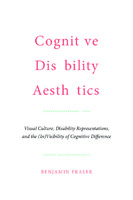Cognitive Disability Aesthetics
Visual Culture, Disability Representations, and the (In)Visibility of Cognitive Difference
Author(s)
Fraser, Benjamin
Collection
Knowledge Unlatched (KU)Number
101598Language
EnglishAbstract
Cognitive Disability Aesthetics explores the invisibility of cognitive disability in theoretical, historical, social, and cultural contexts. Fraser’s cutting edge research and analysis signals a second-wave in disability studies that prioritizes cognition. He expands upon previous research into physical disability representations and focuses on those disabilities that tend to be least visible in society (autism, Down syndrome, Alzheimer's disease, schizophrenia). Moving beyond established literary approaches analyzing prose representations of disability, the book explores how iconic and indexical modes of signification operate in visual texts. Cognitive Disability Aesthetics successfully reconfigures disability studies in the humanities and exposes the chasm that exists between Anglophone disability studies and disability studies in the Hispanic world.
Keywords
Literature; Alzheimer's disease; Cognition; Disabilities affecting intellectual abilities; Disability; Disability studies; Mental disorder; Schizophrenia; Wrinkles (film)ISBN
9781487518158OCN
1076712516Publisher
University of Toronto PressPublication date and place
2018-06-08Series
Toronto Iberic,Classification
Literary studies: general


 Download
Download